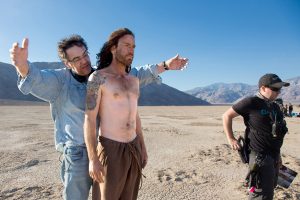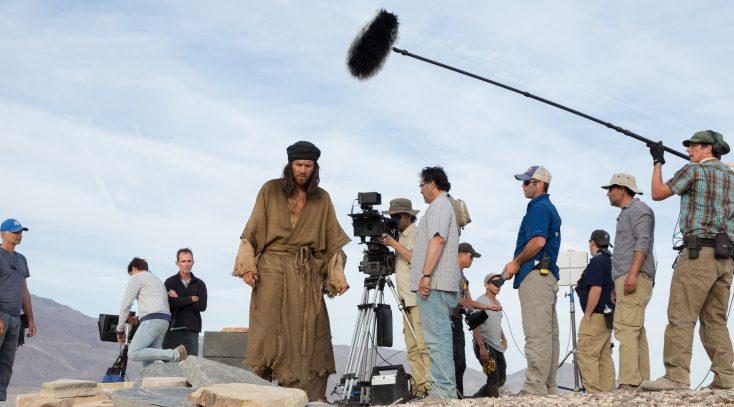
(l to r) Director Rodrigo García and Ewan McGregor working on the set of their new film LAST DAYS IN THE DESERT. ©Broad Green Pictures. CR: François Duhamel / Broad Green Pictures
By ANGELA DAWSON
Front Row Features
HOLLYWOOD—Filmmaker Rodrigo Garcia doesn’t consider himself a particularly religious man, yet he was drawn to the biblical story of Jesus Christ’s 40 days of contemplation and fasting in the desert. The writer/director of “Things You Can Tell Just by Looking at Her” and the Oscar-nominated “Albert Nobbs” saw an opportunity to explore what may have happened during that notable walkabout and what he has come up with in his “Last Days in the Desert,” starring Ewan McGregor, is a character study about fathers and sons.
Garcia, son of noted author Gabriel Garcia Marquez, recently spoke about his newest film project, a departure from the female-driven works for which he is best known. Shot in California’s desolate Joshua Tree, the drama tells the what-if story about how Christ happened upon a family in crisis—a stubborn father, a dying mother and a rebellious teenage son who desires a different life. The devil (also played by McGregor) taunts and tempts the holy man as he nears the last days on his sojourn. The film also stars Ciaran Hinds, Ayelet Zurer and Tye Sheridan.
Q: This film would seem a natural release at Easter. Why is it coming out now?
Garcia: There were a couple of biblical movies at Easter so that was a consideration. At least now it will be—for a little while—the only religion-themed movie there is.
Q: “Last Days in the Desert” is about fathers and father figures with Ewan’s character and his relationship with God and Tye Sheridan’s character and his relationship with his father.
Garcia: Ewan’s character also is a father figure to the boy. That’s how I always thought of it. It’s about a son, Jesus, with a very unique father, getting involved with a father and son and wanting to help, wanting to intervene, out of goodwill. But it’s also potentially hazardous to get involved in other people’s family conflicts. I always thought of him as getting involved and not conscious of what he’s doing. He can’t help it.
Q: Ewan McGregor portrays Jesus as someone with doubts and concerns about what lies ahead for him.
Garcia: There are so many movies where (Jesus) is hardly a man—he’s like an angel—and it’s hard to connect.
Q: Without spoiling it, the ending is melancholy.
Garcia: The boy gets what he wants but, like anything, there’s a price. The mother gets what she wants, but there’s a price. The father gets what at least the mother asks of him—help the boy. And Jesus gets to help but at a cost. Human affairs are messy and I was only looking at the human side of Jesus and, as such, he made some good things in the movie and other things were perhaps a little messy.
Q: You’re not particularly religious so why make a film about Christ?
Garcia: It came to me as a story. Jesus is ready to leave the desert and spends two or three nights with this family and sort of gets caught up in their family drama. I thought that was interesting. I immediately recognized to some extent what I was doing. I’m probably thinking of Jesus coming out without having gotten everything he’d hoped to get from the desert. He’s still hungry for something, and knowing that he has a destiny that he has to fulfill that in some ways has been chosen for him. I’m trying to think as a person would think, not like half-man, half-God or Son of God would think.
As a person he would think, “I have this road and it’s going to be a big one and a difficult one, and am I ready? Am I good enough?” In the midst of those doubts he comes into contact with a father and son who have their own conflict, I thought it was interesting that would suck him in. So I really came at it from a pure story point of view, almost a literary conceit. I take a character from life and history and religion, like Jesus, and then put him in the context of a story that I want to tell.
I didn’t think of it as a religious movie. Of course, it’s been a while now and I realize if you’re making a story with Jesus, then it’s about Jesus. He’s not just a prop.
Q: With such a small cast, was it more than usually critical to get the right actors for this?
Garcia: You always feel like you have to get everyone exactly right. When you have a big cast, you have to make sure the little parts don’t have cracks from which things fall. But here there were basically four people playing five roles. Ewan, obviously, a very good actor. Most of the all, he has that humanity. He projects such compassion and caring and interest in the other. That was super important to me. Ciaran Hinds is someone who seems like he could really be out there in the desert. He’s very rugged and masculine with a face and physique that he could have lived in almost any century. I’d seen him in many movies as have a lot of people who don’t even recognize him or know what his name is. He’s just one of those guys who does so many things well. Tye I’d seen as one of the boys in “Tree of Life.” And then I saw him in “Mud,” which confirmed that he was someone who could carry a movie. And Ayelet Zurer is someone whom I’d known her work on Israeli TV.
The only thing I struggled with, and this is not uncommon with movie stars, is that they’re all so beautiful, no matter how much dirt you throw on them. In fact, the more dirt I threw on them, the better they looked. The crappier the wardrobe, the more dry mud on the face. With Ayelet, the sicker we tried to make her look, she was still beautiful.
Q: How did you film the scenes of Ewan McGregor’s characters speaking to each other?
Garcia: We had another actor, Nash Edgerton, who was playing (opposite) Ewan. That’s who you see over Ewan’s shoulder. We’d shoot Ewan in one direction and then the other.
Q: Did Ewan suggest some things about either character that you didn’t think of when you were writing the script?
Garcia: We talked about Jesus and read about Jesus and then did what we wanted since no two books are the same. He, by his own admission, didn’t give Lucifer much thought until a couple of days before we were going to shoot. The demon is very expressive and there’s a lot of humor there. He’s very clear so you didn’t have to figure him out. He’s a fun character by a very elementary character. He’s just there to screw with Jesus’ head. He has his lying, his humor, his irony and his putdowns—so it’s not a role that needs a great deal of thinking about.
Ewan said it was scary that he hadn’t thought of (Lucifer) that much but he played him perfectly well. I think he was more concerned about how he would play Jesus. I don’t know whether I had it in the script, but I told Ewan that the demon is more vain so he wears jewelry. Other than that, he just brought two tones. You just know from looking at his face or hearing the tone of his voice, you always know who’s talking. It’s amazing that with the same face and same wardrobe, they seem to be two different people.
Q: What are you working on now or next?
Garcia: I’m developing a couple of (TV) series. I’d like to do a miniseries that I adapted from someone else’s idea. I want to try to do a movie that doesn’t go back to my usual women in sort of contemporary psychological drama. I do miss (writing) women’s characters but I might want to do something that’s more genre, more like a fantasy movie or a horror movie. I just finished a pilot for CBS, but it wasn’t something I wrote. I’m just waiting to hear if that will go to series.





